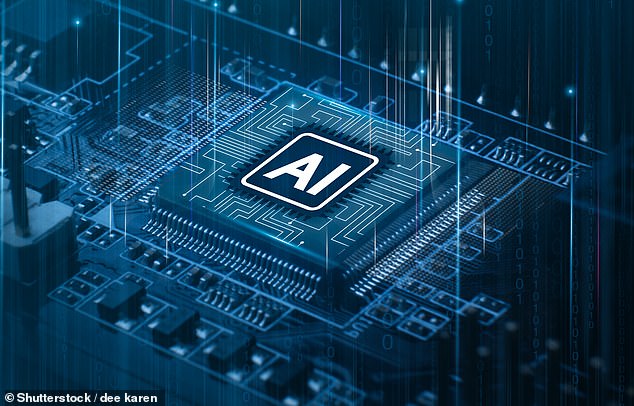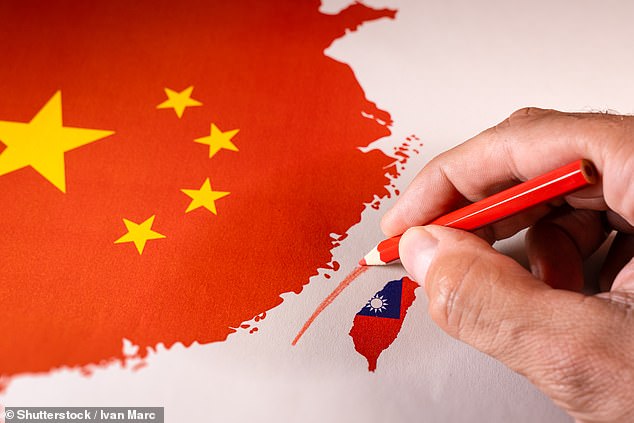Fears of a global stock market crash deepened this weekend amid dire warnings that the semiconductor sector powering the artificial intelligence boom would be ‘completely destroyed’ if China invaded Taiwan.
It comes after the Bank of England, the International Monetary Fund and the boss of America’s biggest bank sounded the alarm, saying that the AI-fuelled growth in share prices had pushed valuations towards levels last seen at the height of the dot-com mania 25 years ago.
Meanwhile traders are braced for a turbulent start to the week after President Donald Trump threatened on Friday to slap ‘massive’ tariffs on China, causing global stock markets to sink.
Much of the rapid growth in share prices has been driven by a small number of technology stocks, led by Nvidia – the world’s biggest quoted company with a price tag of around $4.5 trillion

Rapid growth: Nearly all of Nvidia’s powerful computer chips used in the most advanced AI models are made in Taiwan by one company, TSMC
Nearly all of Nvidia’s powerful computer chips used in the most advanced AI models are made in Taiwan by one company, TSMC.
Taiwan also supplies 60 per cent of the world’s semiconductors – silicon discs with billions of transistors carved into them – which underpin all computing.
But the supply of these chips could be halted and share prices could collapse if – as security experts increasingly fear – China carries out its long-standing threat to ‘re-unite’ itself with Taiwan, by force if necessary.
In the starkest warning yet from a senior official, Francois Wu, Taiwan’s deputy foreign minister, said an invasion would be ‘the end of the world’. ‘I do not mean that a nuclear war will happen, but the modern world economy will be finished for ever,’ Wu told The Mail on Sunday. ‘We will not weaponise our chip industry, but if China invades Taiwan the sector will either be completely destroyed or occupied by Beijing.’
Moving Taiwan’s chip factories to another country would not solve the problem, Wu added.
The US has vowed to defend Taiwan with force in the event of an attack. It recently warned the threat to the island was ‘imminent’, with Beijing capable of a full-scale invasion by 2027.

Taking action: Taiwan has unveiled plans to build a new air defence system, dubbed the T-Dome, to protect it from what he called ‘hostile threats’
On Friday, Taiwan’s president William Lai unveiled plans to build a new air defence system, dubbed the T-Dome, to protect it from what he called ‘hostile threats’, though he stopped short of mentioning China by name.
The island is also planning to increase its defence spending to 5 per cent of its national output (gross domestic product or GDP) by 2030, double its current level of about 2.5 per cent.
Chancellor Rachel Reeves has pinned her hopes on AI to kickstart sluggish growth in the UK by boosting productivity – how much useful output in goods or services each worker achieves.
Energy-hungry data centres that house computer systems are springing up across the country in support of this, but the threat of the AI bubble bursting could derail her plan entirely.
‘Cutting off Taiwan’s semiconductor production, including the advanced chips that only Taiwan knows how to make at scale, would have a far reaching impact,’ said Andrew Yeh, of the China Strategic Risks Institute, a London-based think-tank.
‘The effect on the global AI boom could be severe, and a real brake on economic growth for the UK and other countries betting big on AI,’ he said. ‘Taiwan’s chip supply is the backbone of advanced manufacturing worldwide. With the surge in demand for computing driven by AI, these semiconductors are more important than ever.’
Both the Bank of England and the International Monetary Fund warned last week that the risk of a sharp market ‘correction’ – a sudden drop in share prices – had increased, fuelled by the AI hype.
They were joined by Jamie Dimon, boss of JPMorgan Chase, who said he was ‘far more worried than others’ about the risk of a serious market correction in the next six months to two years.
Some of the billions being poured into AI would ‘probably be lost’, he added.
A spate of ‘circular’ deals in the sector has also sparked concerns that a new technological bubble in AI spending is brewing.
They include a tie-up between OpenAI – the firm behind the ChatGPT chatbot – and Nvidia’s rival AMD. Under the deal OpenAI will buy AMD’s chips in return for AMD receiving an option to buy its shares.
Nvidia also plans to invest $100 billion in OpenAI.
Your browser does not support iframes.
DIY INVESTING PLATFORMS

AJ Bell

AJ Bell
Easy investing and ready-made portfolios

Hargreaves Lansdown

Hargreaves Lansdown
Free fund dealing and investment ideas

interactive investor

interactive investor
Flat-fee investing from £4.99 per month

InvestEngine

InvestEngine
Account and trading fee-free ETF investing
![]()
Trading 212
![]()
Trading 212
Free share dealing and no account fee
Affiliate links: If you take out a product This is Money may earn a commission. These deals are chosen by our editorial team, as we think they are worth highlighting. This does not affect our editorial independence.
